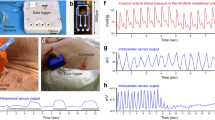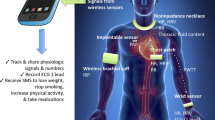Abstract
Medical examinations often extract localized symptoms rather than systemic observations and snap shots rather than continuous monitoring. Using these methodologies, one cannot discretely analyze how a patient’s lifestyle affects his/her physiological conditions and if additional symptoms occur under various stimuli. We present a minimally invasive implantable pressure sensing system that actively monitors long-term physiological changes in real-time. Specifically, we investigate pressure changes in the upper urinary tract per degree of obstruction. Our system integrates three components: a miniaturized sensor module, a lightweight embedded central processing unit with battery, and a PDA. Our tether-free system measures pressure continuously for forty-eight hours and actively transmits an outgoing signal from an implanted sensor node to a remote PDA twenty feet away. The software in this in-vivo system is remotely reconfigurable and can be updated when needed. Preliminary experimental results of the in-vivo pressure system demonstrate how it can wirelessly transmit pressure readings measuring 0 to 1 PSI with an accuracy of 0.02 PSI. The challenges in biocompatible packaging, transducer drift, power management, and in-vivo signal transmission are discussed. This research brings researchers a step closer to continuous, real-time systemic monitoring that will allow one to analyze the dynamic human physiology.
Access this chapter
Tax calculation will be finalised at checkout
Purchases are for personal use only
Preview
Unable to display preview. Download preview PDF.
Similar content being viewed by others
References
Collins CC, “Miniature Passive Pressure Transensor for Implanting in the eye.” IEEE Trans on Biomedical Engineering, vol. BME-14, no. 2, 1967.
Farrar J, Zworykin V, and Baum J. “Pressure-sensitive telemetering capsule for study of gastrointestinal motility”. Science. 1957, 126: 975–976.
Fonseca M, Kroh J, White J, and Allen M, “Flexible Wireless Passive Pressure Sensors for Biomedical Applications,” Tech. Dig. Solid-State Sensor, Actuator, and Microsystems Workshop (Hilton Head 2006), June 2006.
Fonseca M, English J, von Arx M, and Allen M. “High Temperature Characterization of Ceramic Pressure Sensors.” Proc Transducers 2001. Vol. 1, p 486–489, 2001.
Han C., Rengaswamy R., Shea R., Kohler E., and Srivastava M. “SOS: A Dynamic Operating System for Sensor Networks”. Third International Conference on Mobile Systems, Applications, And Services (Mobisys), Seattle, Washington, 2005.
Haga Y. Biomedical micro-systems for minimally invasive diagnosis and treatment. Proceedings of the IEEE, 92(1), 98–114.
Mackay R, Jacobson B. “Endoradiosonde”. Nature. 1957; 179: 1239–1240.
Piper I. “Urethral pressure measurement”. Scand J Urol Nephrol Suppl, 207, 61–66.
Rose B. “Diagnosis of Urinary Tract Obstruction and Hydronephrosis” at www.uptodate.com. Accessed December 4, 2004.
Author information
Authors and Affiliations
Corresponding authors
Editor information
Editors and Affiliations
Rights and permissions
Copyright information
© 2007 International Federation for Medical and Biological Engineering
About this paper
Cite this paper
Lin, C.C.K. et al. (2007). The Development of an In-Vivo Active Pressure Monitoring System. In: Leonhardt, S., Falck, T., Mähönen, P. (eds) 4th International Workshop on Wearable and Implantable Body Sensor Networks (BSN 2007). IFMBE Proceedings, vol 13. Springer, Berlin, Heidelberg. https://doi.org/10.1007/978-3-540-70994-7_18
Download citation
DOI: https://doi.org/10.1007/978-3-540-70994-7_18
Publisher Name: Springer, Berlin, Heidelberg
Print ISBN: 978-3-540-70993-0
Online ISBN: 978-3-540-70994-7
eBook Packages: EngineeringEngineering (R0)




